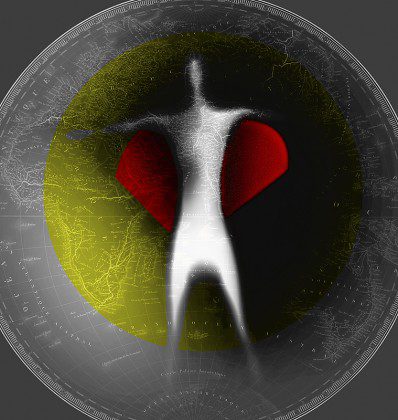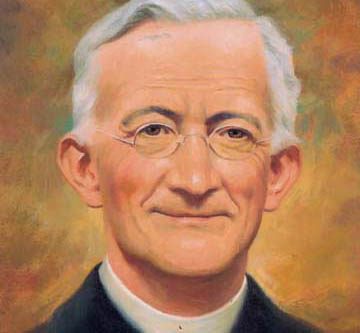
Celebrating Fr. Leo John Dehon
March 14 is the 169th anniversary of the birth of Fr. Leo John Dehon, founder of the Priests of the Sacred Heart. Each year the Superior General writes a letter to commemorate the date. This year, Fr. José Ornelas Carvalho focuses on “internationality;” it is the focus of the general administration in 2012.
“It is a new world that is being born and, as the theme of Internationality indicates, we want to be part of it,” writes Fr. Ornelas. “It means becoming part of a change of mentality of how “new” religious work and live together. The world is looking for a vanguard – an eschatological glimpse – of what a new humanity in this new configuration of peoples looks like. The congregation is challenging us this year to open this window more widely.”
The rest of Fr. General’s letter appears below.
A prayer vigil for the day, particularly geared toward the laity and youth, has been prepared. Click here to download a PDF of it. The original was in Italian; the English translation was done by Fr. Bernie Rosinski.
Letter for March 14, celebrating the birth of Fr. Leo John Dehon
Dear Confreres,
It has become customary on the birthday of Fr. Dehon, March 14, to declare a Dehonian Vocation Day. In many of our communities it has become a day of prayer, a day of celebrating our vocation as Dehonians. This year is no exception.
In the last few years, the General Administration has suggested to the Congregation to celebrate our vocation as Dehonians by taking a specific aspect of Dehon’s life and vocation, not as a literal reliving, but as a creative refiguration. In this light, we have searched out the charism which Fr. Dehon has left us, looking at it through the prism of our time. Dehon’s world – his historical moment, the social, political and ecclesial issues of late nineteenth and early twentieth century – is receding further and further from our vision. What feeds our memory of him and affirms our Dehonian vocation is less and less the concrete events, the short bursts of the daily history of his life. More and more we find Fr. Dehon in the events of the longer duration, as French historiography calls them. These memories of the longer duration are stimulated by aspects of Dehon’s life that emerge not from the narration of the sequence of events in Fr. Dehon’s life, but from meanings of his life that become apparent only later when viewed in the context of the larger movements of his time. For instance, we recognize the significance of Fr. Dehon’s spiritual life in the framework of other spiritual movements at the end of the nineteenth century. We acknowledge his meaning for us in the way Fr. Dehon links up with the hopes, dreams and struggles of our time. We rightfully ask today, “How can we translate Dehon’s charism to our time so that it stimulates us and gives a particular thrust to our world? What gives a “longer duration” to Fr. Dehon?”
One trait of Fr. Dehon’s longer duration may well be his cosmopolitan or international outlook. Sometimes we Dehonians joke about the many travels of Fr. Dehon – aware of the image they give of privilege. However, as narrated to us in his many travelogues, these voyages displayed an intense interest in the broader world. Of course, Leo Dehon saw the world through French eyes and he was deeply conscious of a specific role that “Catholic” France had to play in the world. But circumstances and the Congregation changed him and made him more and more a citizen of the world. This aspect of Dehon beyond ethnic, national boundaries we believe to be part of this broader meaning of Dehon as person. We begin to see Dehon and Dehonians as internationals.
This year the General Administration has taken this internationality as its main theme. The theme has been entering into our consciousness ever more urgently since the General Chapter of 1997’s motto “We, the Congregation.” The world in which we now live with its massive movements of people which is transforming and breaking down our narrow understanding of “nations” and “nationalism,” is calling for new citizens. The ethnic identities shaped by nation states are more and more being challenged. Jesus, drawing on the Jewish tradition, is our best exemplar. From him we received the vocation to “go to make disciples of all nations” (Mt 28.19). To him the culminating act of history was the making of a sacred assembly of all peoples. Our time makes this call sound new and different.
Our way of hearing this call must be different from the colonialist perspective of the 19th century. Post-colonial we may not yet be. We must, however, work on breaking down this corrosive ideology. We see this already taking place in many areas of the world today. Fr. Dehon could not have imagined the world as we perceive it today. Many parts of the congregation live and work in areas of the world where people from different countries have gathered into new communities. This gathering of people is accompanied by tensions – this new world’s birth pangs can be intense – but also by opportunities and new forms of life.
It is a new world that is being born and, as the theme of Internationality indicates, we want to be part of it. It means becoming part of a change of mentality of how “new” religious work and live together. The world is looking for a vanguard – an eschatological glimpse – of what a new humanity in this new configuration of peoples looks like. The congregation is challenging us this year to open this window more widely.
In order to allow us to see this world as part of the broader meaning of Fr. Dehon as person, we are sending a text attachment that portrays the experience Fr. Dehon had as an international person.
In celebrating the birthday of Leo Dehon, the Founder, we also hope that he may inspire us to look at our vocation in a new light. In praying for vocations, we ask that we may have the courage to break through our narrow “nationalisms”, our human-made boundaries, and share our culture, our meanings, with others in order to show that we are, in all our differences, members of one family and can give witness to a unity in diversity in the way of Christ. It is the challenge that we wish to share with you this year.
In the footsteps of Fr. Dehon, we urge you to glory in the Heart of Christ,
Fr. José Ornelas Carvalho, and his Council
Leo Dehon and the Internationalization of his Congregation
We all are aware of the many trips taken by Fr. Dehon, both as a youth and after he founded the Congregation of the Priests of the Sacred Heart. We ask ourselves, nonetheless, whether this was a peripheral matter or whether his contacts with persons, situations, and the variety of cultures had an influence on his personal being in such a way as to affect his foundational activity. Did his personal experience have a bearing on the international dimension that our Congregation exhibited from its very beginning?
Seeking to pull together the thinking of Fr. Dehon on this matter, we note that in his writings various topics seem to be convergent and complementary indicators, even if he rarely fully develops each single one. The subject of travel is not directly treated in his writings but he makes frequent allusions, instead, when he writes to his family, friends, and missionaries, allusions in which are found a lively sensibility to the universal mission of the church and for an evangelization he hopes will embrace the entire world.
However, in thinking the matter over, before examining what he wrote, we should take a look at his life to see how he came to develop a perspective that customarily went beyond national borders and opened up to the universal in his personal experience and formation. We need to insert ourselves into the very center of his personality, to look at his human and Christian qualities. It is certainly true that the universal and international theological vision he had for his Congregation was always based on personal, affective, and emotional aspects that we meet in his life.
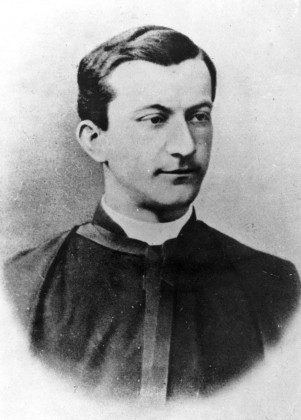
To begin with, we have no doubt about the passion of Fr. Dehon for his native France, of the pride he took in being born of a traditionally Christian family, of his devoted love for his native land, his local province, his culture, and especially the French church. Yet we also see that from his childhood the unanticipated events of life led his thinking beyond the borders of his little world at La Capelle, and later beyond the France of his era. Being born in a family that was well-off was not a minor factor in his make-up, with its possibility for travel, in a region with big factories and great industrialists and endowed with rich cultural surroundings; he was aware of an evolving social order that was shifting from the artisan to the modern era of industrialization and technology.
The process that began opening his spirit toward internationality started quickly with his parents sending him off to school at Hazebrouck. Here, the 12 year old youth encountered an environment different than his own; he was in French Flanders, on the Belgian border, and this factor starts changing his very impressionable and sensitive attitude (he speaks of the virtue of the Northern clergy). He opens up to new horizons, both intellectual and spiritual, as he writes in his “Notes on the History of My Life”[1]. The same year he entered school, 1855, he took his first big trip, visiting the World Fair in Paris with his father. Many other trips across countless borders will follow this first impressive encounter by the young Dehon with the world at large and will imprint his heart and mind with a vision and thinking as wide as the world.
His attendance at Paris as a law student will permit him to live in a cosmopolitan city fully evolving as a ‘modern’ city and will enable him to come into contact with people from many countries and a variety of social conditions. In his own words he states: “I received many graces. I came into contact with great intellectual developments. I learned to study the world without being tarred by it”[2]. With Palustre as his companion, an influential friend from his student days in Paris, he will visit England, Ireland, and Scotland in 1862. Initially the year was intended to be spent in London for the purpose of learning English. This friend will transmit a passion for art, literature, and archeology. Immediately thereafter, this friend will travel with Dehon to the North of Europe and they will visit Germany, Denmark, Sweden, and Norway. When these travels are over, the two friends will travel to Austria in 1863 where a visit with Count Chambord, the pretender to the French throne (Henry V) will take place. When his law studies are completed, Dehon will travel with his friend to Holland and Belgium.
The most important trip he made at this stage of his life was certainly the one to the Middle East in 1864 where, in visiting the sacred sites, he found reinforcement for his priestly calling. Using the sole means available at the time to achieve it, land and sea, it allowed him to traverse many countries: Italy, Dalmatia, Albania, Greece, Egypt, Palestine, and the city of Rome upon return. His notes taken during his travels at this period reveal his constant interest in what is going on, seeking information, a predilection for exchange and relationships. All this will reappear when he has matured as an indefatigable reader and writer, a perpetual participant at meetings and congresses, a person interested in culture and willing to spread its values; we can characterize him as a true son of the universal church of his time and a citizen of the world.
A little later on, his presence at Rome from 1865-1871 as a seminarian will permit him to live and study in a city with immense potential for getting to know the various cultures of the world and allow him to have a lively experience of the rich internationality of the church, precisely as “Catholic”, a theological concept that is deeper than that of mere internationality. Two factors contribute to the enrichment of his ecclesial experience of catholicity: his studies at the Gregorian University where he spent four years under the guidance of the Jesuits with students from many countries[3] and his participation as stenographer at Vatican Council I (1869-1870). There he was able to directly come to know the mindset and the sentiments of the entire Catholic Church, including Oriental churches. His “Diary of the Council” holds texts that witness this exceptional experience.[4] His prayer at the outset of the Council will be: “My God, the world hungers for peace, faith, and religion. Unite it in all your ways. Enlighten the nations with what they stand in need of and strengthen the unity and authority of your church…”[5]
Returning to France, Dehon did not closet himself in the little world of St. Quentin, his first diocesan assignment. Instead, his spirituality, increasingly more directed toward Sacred Heart devotion, led him to formulate a plan for society that he will call “the social Reign of the Heart of Jesus”. This was aimed not only for France; in his mind it was clear that this Reign was to be extended to “all societies’. Hence his admiration for what transpired in the distant Latin American country of Ecuador and for its president, Garcia Moreno, who consecrated the country to the Heart of Jesus. The religious congregation was barely established when he formulated an apostolic project whose goal was that the “social Reign” should reach out to every nation because this “reign”, the “reign” of Christ, was universal. The notion was based on a gospel proclamation to the entire world in time and space and should permeate every sector of society and every aspect of human existence.[6]
It was for this reason that he organized an international novitiate and minor seminary at Watersleyde-Sittard (Holland, 1883) from the very outset; French, German, and Dutch novices and religious were its occupants. The year before, he wanted to start something in England but did not succeed due to the opposition of the Bishop of Soissons. Afterwards there came the foundations in Belgium (Clairefontaine, Brussels) and then Limpertsberg in Luxemburg and Rome as well. The missions in Ecuador, Brazil, and Congo were established during this initial stage. To the degree possible, he organized two formation houses of an international nature: the scholasticates at Lille (1884) and at Rome (1894). He was profoundly patriotic yet devoid of any blind or chauvinistic feelings as he demonstrated during the First World War. When faced with “defects of a nation-wide character” he reacted as energetically as he did to the excessive nationalism he witnessed during the war. For Dehon, “the nations were the work of God” and the sint unum aspect of his spirituality precluded any exaggerated patriotism and any intolerant racism since in heaven there will be no nations but only the communion of saints and this is the reason why charity must take absolute primacy among God’s own.
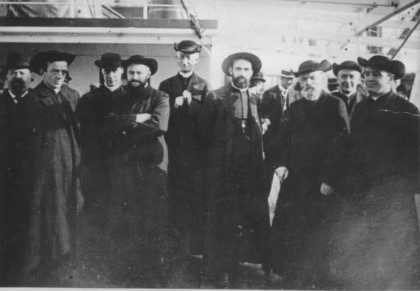
In Fr. Dehon, the source from which he drew the mindset for his religious that we today call “global” was the centrality that Christ was to be for their lives in order to make the universal Reign of charity and social justice flowing from the Heart of the Savior present in the world. This was the unique and universal mediation of the Christ-Messiah that led Fr. Dehon to formulate his ambitious and, obviously international, plan: the Reign of the Heart of Christ “in societies”, plural. Here are several significant statements: “Our God is not just a God of private life, a God of chapels; he is also the King of kings, the God of the social order. His law and grace should penetrate the civil and economic life of peoples. His church is the depository of principles that give life and lift up equally both public and private life”[7]
Speaking to alumni of the school at Bergen-op-Zoom (Holland), he offers an explanation of his work: “To work with every possible means for the Reign of the Sacred Heart in families and in societies: no ideal is more beautiful than this one” (January 2, 1919). Speaking to Italian novices on December 20, 1921 he said: “We must be faithful to our ideal: to work for the Reign of the Sacred Heart throughout the entire world, striving to make his Reign reality in us through union with our Lord.”
His passionate desire to extend this Reign will lead him to undertake a trip around the world at sixty years of age, leaving France to participate at the Eucharistic Congress at Montreal in 1910. He would travel from there to other Canadian cities, and visit the United States, Japan, Korea, China, the Philippines, Indonesia, and India. He ended this trip by making a second visit to the Holy Land via the Red Sea. His daily journals not only indicate the places he visited but showed his interest in the culture, customs, and religions of the peoples he visited; they reveal an outlook that today we would describe as belonging to sociologists. However, his greater interest lay in the missions and the evangelizing work of the church in these countries which were far from Europe. His relations with bishops throughout the world, from Canada to Brazil, in his travels from Asian countries to Latin American countries, will facilitate the expansion of his congregation in the years to come.
His drive to develop the Reign of the Heart of Jesus is clearly manifest from its very foundation in the international scope that he invests his congregation with through missions in distant territories.[8] The colonial expansion of European countries served Fr. Dehon as a platform from which to found missions outside Europe. The first country will be Latin American: Ecuador (1888); then will come Africa with Belgian Congo (1897), Cameroon (1912), South Africa (1923). He is also thinking of the mostly Protestant countries and organizes missions for Sweden, Canada, Finland (1907). Brazil will be important in Latin America. Once the First World War is terminated, while the congregation is being rebuilt, he does not hesitate to send missionaries to the Cameroon, to the Congo, and to Gariep in South Africa as well as to Sumatra (Indonesia), the latter two coming in 1923. During this same year he accepts a mission in South Dakota in the United States. As a benefit of the presence of German religious in the Cameroon, he will have an establishment in Spain, too, when the missionaries who fled from the Cameroon arrive in the southern part of Spain and within a few years have a high school and a house of formation (1919).
Against all this background, it is no insubstantial matter that Fr. Dehon managed, with the help of Count de Piellat, to purchase some land in Palestine at Nazareth to permit the presence of his religious within the confines of the Turkish Ottoman Empire. At the same time it is an amazing fact that in 1921 he was preparing for a presence in Afghanistan which was to begin with a few Dutch religious.
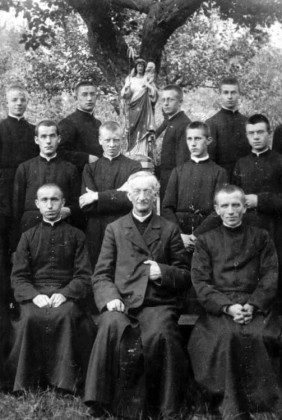
This entire treatment on internationality should not be seen as Dehon’s strategy to disseminate his congregation, but a consequence of what he lived spiritually: “console the Lord, build up the church faced with what she is experiencing in Europe, in France” (Letter of December 13, 1910); “the missions ought always be for us an exercise of charity and reparation” (Letter of March 24, 1923). At the end of his life he would be able to write a letter to Sr. Mary of St. Ignatius: “From my childhood, I wanted to be a missionary and a martyr: missionary I am through my hundred or so priests in the four corners of the world; martyr I was through the great crosses born from 1878-1884 . . . Our Lord accepted my vow of victim made on June 28, 1878”.[9] The central place occupied by the incarnation of the Word and the consequences this had for the salvation of all was the most profound motive that led Fr. Dehon to this global mission, given that the church as the new Israel and messianic people was to be a “catholic” community: “The Heart of Jesus, Sun of Justice lifted above the minds and hearts of the world, is destined to shine upon the entire world through the gospel which must bring to all nations the caring influence of his divine enlightenment. ..” [1]0
To belong to Christ means, according to the way Dehon understood this belonging, a desire to serve the “kingship” of the Incarnate Word and to extend this throughout the world since He is “Christ the King” according to the spirit of the times and His kingdom will be seen when the mission of establishing the gospel in the social life of the people who are open to democracy and modernity is achieved. The central part played by Christ in the life of Fr. Dehon led him to see the ecclesial consequences of the Incarnation: “Our Lord invites us to hear his church which speaks to us through the teachings of its doctrine, its worship, its divine office. . . God helps us grasp his infinite justice satisfied through the God-man; his infinite mercy lifts us up to him through his incarnation. . .”[10] “When it comes to things of faith, all men are children and need the direction of the church of God. Better, they have the right [to it] and to deprive them of it is tyranny”[11]
Taking a last glance at the trips Dehon took, his international contacts and the varying cultural contexts Dehon met up with, one becomes aware that his vision and perception were supported by a spiritual understanding different than our own. This is not how we understand internationality. For Fr. Dehon his interest in other nations and cultures was nourished by his appreciation of the incarnation of the Word in various world situations. He recognized and valued in it the universality of the Reign of Christ. He transmitted this sensibility to his congregation, which, at his death, was present in twenty different countries on four continents. Despite the twists we now know our world has taken, which might have been foreseen in his time, there is no doubt we can find in Dehon the bases for a new understanding of how to live and work together in the twenty-first century. What he gave us are first efforts. What we learn from Dehon is the interest he took in the world which was opened up to him in his travels. Our task today is to find the way toward what is other in our world.
[1] Cf. NHV 1,13v.
[2] NHV 1,3v.
[3] Dehon marveled that half the philosophy students at the Gregorian University were lay people, because such studies were required for other careers. And making reference to the many countries represented there, he says, in writing to his parents, “it is a tower of Babel (by reason of the various colors of student garb). Nor should one marvel that all the classes are taught in Latin. It is the only language understood by everyone. In itself, this is a sign of the universality of the church. The difficulties between nations are forgotten and there are discussions between the English, Germans, Spaniards, Americans, Irish, Belgians, Poles, etc.” (Letter of 03/05/1866). Cited in G. Manzoni Leone Dehon e il suo messaggio, EDB, Bologna 1989, 111-112.
[4] Cf. the edition of V. Carbone: Leon Dehon, SCJ Diario del Concilio Vaticano I, ed. El Reino del Corazón de Jésus, Madrid 1962.
[5] L. Dehon, NQT 1/1869,22 (6 December).
[6] “Conquer the world for Jesus Christ . . . each day I unite myself to all these souls. I would like to practice my ideal to the limit. I ardently love our Lord and I desire to promote his Reign of the Sacred Heart” NQT XLV (1925) 2-3.
[7] L. Dehon La Rénovation social chrétienne (1900) in OSC III 310. Cf. also the meditation for January 16, Le règne social du Sacré Coeur, in OSP III, 62-64; and meditation 26 Le Coeur sacerdotal de Jésus.
[8]Cf. Fr. Paul McGuire, in Dehoniana (2002/2), 169-186; Lettere circolari n. 326
[9] Letter of December 8, 1924: text found repeated in NQT (1925) 1-2
[10] L. Dehon, NQT 1/1868, 60-61 (March 10).
[11] Ibid., 71 (March 30).

